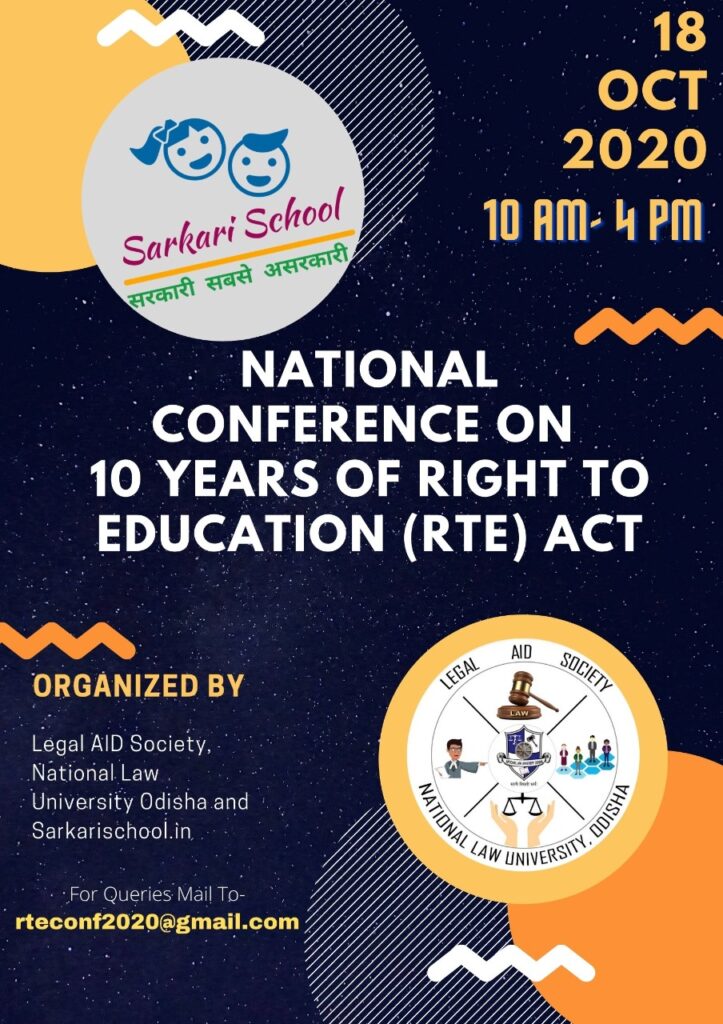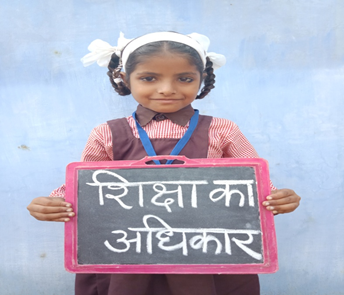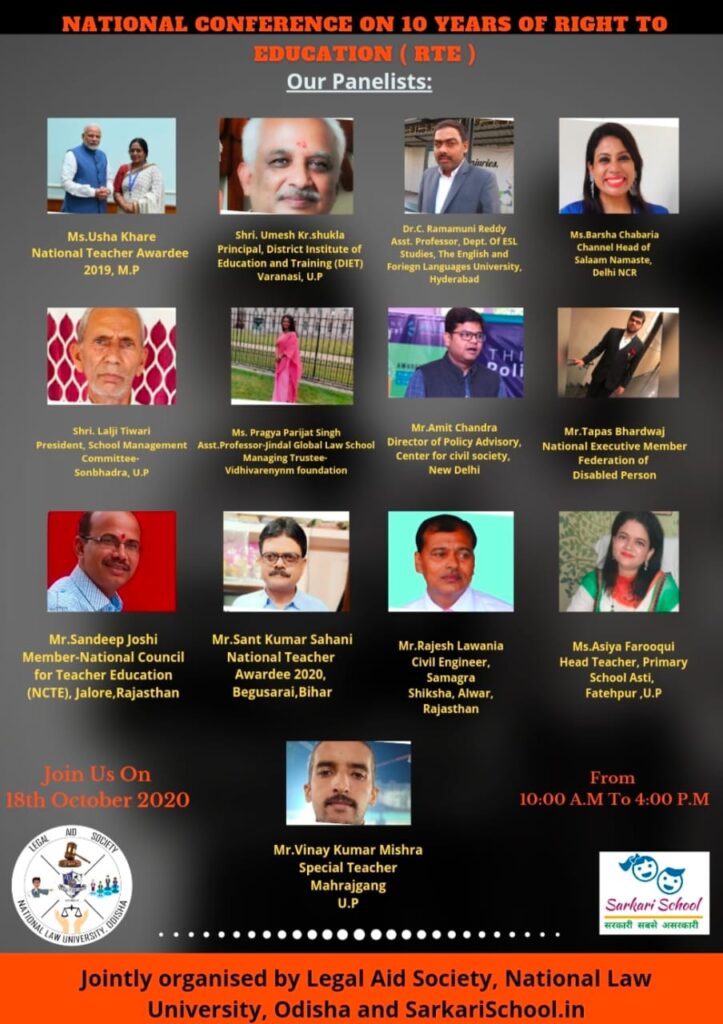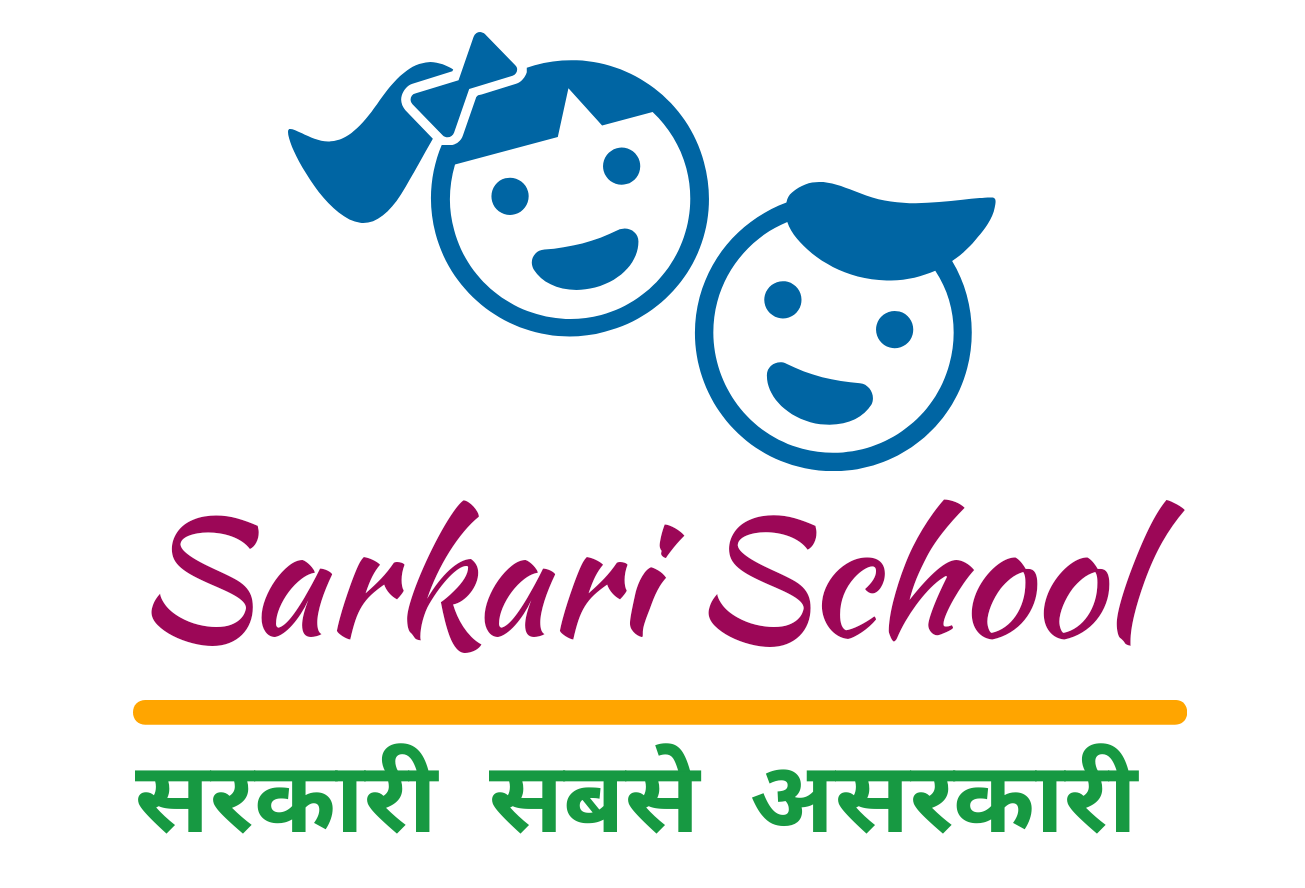

10 YEARS OF RIGHT TO EDUCATION

We at Sarkari School work with an initiative to build a platform for those working in the field of school education, to uplift the future of younger generation through their hard-work, those who are not related to government or any organization but are helping the neglected strata of the Indian society. These heroes need recognition not only to appreciate the efforts but to motivate others, in terms of making things possible with no support and with just self-determination.
Our vision is to make people aware of government schools, which in spite of limited resources and challenges are working hard to fulfil the dreams of students. This platform is just an attempt to set a pro-government school narrative, sharing positive aspects of it and raising the policy matters.

About Sarkari School:
About Legal Aid Society, NLUO
National Law University Odisha (“NLU Odisha”) was established in the year 2008 by the Odisha government with a vision to develop as a Centre of Excellence in Legal Education, to emerge as a place of professional learning, and to further nurture the idea of “serviceability” to the people to carry forward the social justice mission of legal education. In furtherance of the same, the Legal Aid Society of NLU Odisha was established in the year 2012 with a mission to implement the mandate of the Legal Services Authorities Act, 1987. Since its constitution, the society has been working with the aim of bridging the gap between what the law promises to offer and the actual realities of the law. It percolates the idea of community outreach through literary camps, social mobilization camps, surveys etc. It has been one of the most vibrant committees of NLUO fraternity so far.
About the conference:
India has approx 1.5 million schools, 5 million teachers and 130 million students. In 1906, Gopal Krishna Gokhale made a plea to imperial legislative Council for the introduction of Fundamental & Compulsory Education and in 1947’s Constituent Assembly Sub-committee on Fundamental rights whose Chairperson was Mr JB Kriplani, places free and compulsory education on list of Fundamental Rights; so that the society and government together ensure that it is a right of a child to get an education. After a lot of rejection, debates and discussions; The Constitution (Eighty-sixth Amendment) Act, 2002 inserted Article 21-A in the Constitution of India to provide free and compulsory education of all children in the age group of six to fourteen years as a Fundamental Right in such a manner as the State may, by law, determine. This RTE Act came into effect on 1 April 2010. So basically after a struggle of 100 years, the dream came true. Through this conference, we envisage highlighting the changes that came in our country post 10 years of RTE: our achievements as well as challenges that still need to be addressed.
Date: 18th October 2020
Time: 10:00 A.M – 04:00 PM
About call for Research Papers:
On this occasion, we cordially invite submissions pertaining to implementation and challenges faced by Right to education Act in India. The best three authors will be given an opportunity to present their paper in the conference in the presence of our eminent panelist. Every selected article will be acknowledged with a certificate of appreciation.
The Sub-themes for the articles are listed below. Authors are requested to target their research within the boundaries of these themes itself.
- Impact of RTE on
- 1-Girl’s Education
- 2-School infrastructure
- 3-Enrollment rate
- 4-Inclusion of differently-abled
- 5-Literacy rate
- Social and economical implication on right to education
- Role of RTE in child-centred education
- RTE in view of government and private schools
- RTE paving the way for the democratization of education
- How has the RTE act failed to ensure 25% reservation to poor students in private schools?( As the act aims it to do)
- Revolution of the education system and the way forward
- Right to education and gender equality
- The education system for the disabled.
- The need to uphold the RTE act during a pandemic
- How can India’s Education System escape the vicious cycle of inequality and discrimination
- Impact of media on the Right to education.
- Right to education in the era of digital learning.
Submission guidelines:
- The submission should be the original work of the author and not under consideration for publication in any other journal, blog or like platform. Candid Views will be given preference.
- 2 Co-authors permitted.
- Eligibility- academicians and student between 18-35 years of age.
- A relevant photograph of the subject matter of the post will be preferable.
- Word limit: 2000 words (exclusive of footnote).
- Font: Times New Roman. Font Size: 12, Line spacing: 1.5
- Relevant sources must be duly acknowledged and All submission must follow the “ The Bluebook: A Uniform System of Citation ( 20th edition).
- The selection procedure will include approval of the abstract. Interested candidate shall submit their abstract of 300 words till 2nd October 2020, 11:59 pm. The communication of approval of the abstract will follow the selection of the research paper. The final selection of research papers is confined to the absolute discretion of the editorial board.
- The last date to submit the research paper is 14th October 2020, 11:59 pm.
- Submissions should be mailed to [email protected] in .docx format with the subject as “Submission for RTE”.
Authors shall receive an acknowledgement email on receipt of the abstract within 7 days.
Rewards:
- The selected manuscripts will be published on our website.
- An e-certificate will be provided for all selected manuscripts.
- The best ten papers would get a chance to present their paper in front of the panellist on the day of the conference.
- The candidates of best three papers would be provided with an internship opportunity at Sarkari School.
- Additionally, the candidates of the best three papers will be provided with LOR from the panellist.
